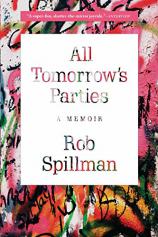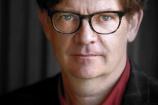All Tomorrow's Parties: A Memoir
Review
All Tomorrow's Parties: A Memoir
To literary cognoscenti, Rob Spillman is well-known as the co-founder and editor of Tin House magazine and the husband of writer Elissa Schappell. In his revealing and energetic memoir, ALL TOMORROW'S PARTIES, Spillman looks back from the perspective of middle age on the first, faltering steps he took along the road to realizing his artistic ambitions. This portrait of the artist as a young man is a captivating story of both personal awakening and the cultural upheaval that accompanied the fall of the Berlin Wall.
The son of two classical musicians, Spillman was born in 1964 in Germany, where his parents settled after graduating from the Eastman School of Music and completing Fulbright scholarships. In November 1989, 17 years after leaving the country, Spillman sits in an East Village bar, watching as the Berlin Wall is breached, an event that spurs him to return to Germany along with Schappell, his wife of less than two years. After an idyllic, absinthe-soaked interlude in a small Portuguese village with their artist friend Hank, they make their way across Europe to Spillman's former home.
"This portrait of the artist as a young man is a captivating story of both personal awakening and the cultural upheaval that accompanied the fall of the Berlin Wall."
Spillman acknowledges that his return to Berlin was motivated by what the Germans call Sehnsucht, "one of those wonderfully untranslatable words that combines longing and nostalgia for a home that one doesn't even know is one's home," rather than any rational career or personal calculation. The rubble-strewn Prenzlauer Berg neighborhood of East Berlin where he and Schappell settle --- in an apartment that rents for $20 per month and that they furnish with items scavenged from the streets --- is home to frequent battles between anarchists and skinheads, as well as lively debates over the perils and promise of German reunification and an active, if ad hoc and somewhat bizarre, night life. Spillman struggles to finish his "Great American Expat novel" he knows will be unpublishable and does his best to avoid seeking remunerative employment he's promised Schappell he'll secure as a freelancer covering track and field for Sports Illustrated.
Spillman paints a colorful portrait of the pent-up dynamism released with the Wall's demise: "Everywhere, doors were being knocked down, secrets spilling out, the frenetic energy stoked by everyone's lack of money," he writes. He's thrilled to be "at the epicenter of post-Wall life, a petri dish of creation and foment, a rubble field in which to create a new world and life with the woman I loved." But for all his enthusiasm, there's an underlying note of skepticism about his German compatriots' ability to overcome the damage wreaked by 45 years of Communist rule.
This lively account of Spillman's German interlude alternates with chapters in which he describes the difficult childhood and adolescence he experienced after his parents separated when he was only four years old and his mother moved back to the United States, eventually followed by his father. By the time he settles into his mother's house in Baltimore as an adolescent (following stops in New Orleans and Lynchburg, Virginia), he was living in his fifth home in five years.
Each summer beginning in 1978, he drives cross-country with his father to the Aspen Music Festival to experience a lifestyle that feels like a "jet-set cocaine-fueled disco fever." These summers mature him quickly beyond his years, and only deepen his malaise when he returns to a miserable prep school existence in Baltimore. Spillman doesn't spare many details of his encounters with drugs and alcohol, his three near-fatal automobile accidents or the dismal start to his college career when he flunks out of the University of Rochester.
But Spillman's Aspen experiences undeniably shape his view of the artistic vocation, one that's both awash in romanticism and infused with naivete: "Safety, comfort, and consistency were things you should get over if you wanted to be an artist," he says in contrasting his nomadic upbringing with Schappell's in the warmth of a stable, loving family. Still, for all his Hemingwayesque pretensions --- including a detour to Pamplona for the running of the bulls --- Spillman traces a gradual evolution toward maturity as his Berlin interlude unfolds.
ALL TOMORROW'S PARTIES ends with Spillman and Schappell's return to the United States after only a few months, with Spillman disillusioned by the path he's charted thus far: "I was so besotted with romantic visions that I dragged us to Boulder, then Portugal, then Berlin, chasing visions, romantic ghosts. I was looking for creativity outside of myself instead of inside of myself. I wanted to be where I was not. I wanted to be someone --- anyone --- I was not." In the two-and-a-half decades since his return, he's been a significant presence in what he calls the "publishing-industrial complex." Now that he's shared this engrossing account of his early years, one can only hope there’s a second installment to come someday.
Reviewed by Harvey Freedenberg on April 15, 2016
All Tomorrow's Parties: A Memoir
- Publication Date: February 14, 2017
- Genres: Memoir, Nonfiction
- Paperback: 352 pages
- Publisher: Grove Press
- ISBN-10: 080212626X
- ISBN-13: 9780802126269





